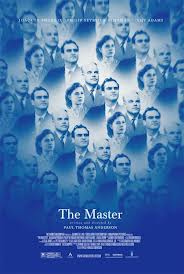As some are confused and wondering if this is a look into the beginnings of Scientology, it’s not entirely about that. While some things may resemble the Church of Scientology, it’s not what the film is about. Instead, we open up with Freddie Quell (Joaquin Phoenix), a tortured, disturbed, alcoholic world-war II veteran, who’s abrasive and unrelenting behavior disconnects him from any society he tries to live in, as he tries to adjust in the real world, which only draws him over the edge of insanity. Soon after, his wondering around the American landscape finds himself in the company of Landcaster Dodd (Phillip Seymour Hoffman), a self-affirmed religious leader of a cult known as, “The Cause,” who inhabits the body and persona of L. Ron Hubbard, but that’s as close as it will be near Scientology. As Freddie seems to find comfort and peace in Dodd’s hands, he becomes the experimental animal for Dodd, as he is subjected to menial tests, which go far beyond comprehension. Soon it’s two dueling forces battling it out as Freddie struggles to deal with Dodd’s innocuous teachings. With Freddie trying to find direction in his life while Dodd manipulating and taming Freddie into his own cause.

If anything people can take away from the film, it’s the the performances from both Phoenix and Hoffman, which are to say the least; astounding. Phoenix’s uncompromising determination to bring a character like Freddie come to life is worth alone to witness the film. He commands the screen in every frame, even as he goes toe-to-toe with Hoffman, yet he maintains a sense of unique authority as an actor. His performance is remarkable in that it’s unlike anything one has ever witnessed. He pours all of his energy into this role, even to just physically look the part with his crooked hunches or by molding his appearance. His determination is sealed into this film even when it requires to do something physically impossible, as he bravely without hesitation surrenders his body to physical brutality in destroying a jail cell by throwing himself against everything or going all-out crazy on bystanders around him, it’s inarguable that he gives the one of the best performances of the year. His behavior alone and reactions give the sense that Freddie is mentally ill and requires more than a father figure in his life. And at the opposite end of the spectrum is Hoffman, whose cool and collected manner gives him the chance to absorb the character of Dodd. Hoffman is more than capable of bringing a character like Dodd, who may seem delusional and admirable, a feeling of humanity as he convinces his peers to his ideas and tries to reign in Freddie with his unorthodox techniques. When both appear on screen, it’s acting of the highest degree. Just one scene in particular as Dodd asks Freddie questions that sound random but give the sense of what auditing must feel. As Freddie is interrogated and Dodd is unrelenting with his questions, seeing both perform against each other is gripping and enthralling to watch.

This almost leads to another point of the role of women around this time period. While Peggy seems to be the dominating force behind Dodd, Freddie is more of a personal of the male cravings for sexual desires. As he sees women as mere sex objects, it gives the viewer in the type of world where Freddie comes from. With flashbacks showing Freddie’s love partner as he leaves for the war, gives a feeling of abandonment. He has no one to care for him. Added to that his aimless sense of direction and purpose - fills his lost void with alcohol and sex. Are women meant to keep men in balance? Are they the real driving force behind a man’s instinct? All of these questions are of great discussion once viewing “The Master.”

Whether Anderson’s newest work is lauded as “audacious” or “painfully dull and unmemorable,” there’s no denying Anderson’s daring ability to experiment and create out of the mold. He’s a filmmaker of higher caliber, and is not one to be working within the confines of mainstream Hollywood. He makes daring films, that whether you can accept them, deserved to be seen regardless, and “The Master” is no exception. It’s a meticulous work of art, blending in themes and ideas never forged unto film, and creating discussions and conversations among its admirers and detractors. It’s fearless, thought-provoking, and best of all, “uncompromising.” The art of film has never felt more alive than watching “The Master,” with performances, especially from Phoenix, soaring higher than the stratosphere, images more alive than any blockbuster, and ideas more intriguing than any film this year. Call this reviewer a believer, but Paul Thomas Anderson is one artist whose work transcends beyond the delusions of grander.
Rating: A by Amritpal Rai


No comments:
Post a Comment